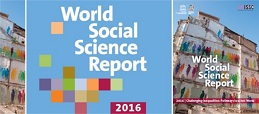« back
World Social Science Report 2016 - Challenging Inequalities: Pathways to a Just World
 January 2017 / Jane Stevens, Communications Coordinator, Institute of Development Studies (IDS)
January 2017 / Jane Stevens, Communications Coordinator, Institute of Development Studies (IDS)
 Much has been made of the recent
Oxfam figures on wealth and inequality, stimulating discussions about statistics and the efficacy of shock headlines.
Whilst there has been
some debate over exactly how inequality is measured and publicised, it is widely recognised that it is extreme, multi-dimensional and is having profoundly negative consequences across the world. 'Reduce inequality within and among countries' is one of the 17 Sustainable Development Goals. At the recent
World Economic Forum in Davos, whose mission was 'Improving the state of the world', income inequality was very much on the agenda.
Much has been made of the recent
Oxfam figures on wealth and inequality, stimulating discussions about statistics and the efficacy of shock headlines.
Whilst there has been
some debate over exactly how inequality is measured and publicised, it is widely recognised that it is extreme, multi-dimensional and is having profoundly negative consequences across the world. 'Reduce inequality within and among countries' is one of the 17 Sustainable Development Goals. At the recent
World Economic Forum in Davos, whose mission was 'Improving the state of the world', income inequality was very much on the agenda.
Yet inequality is about more than just income. Gender, race, ethnicity, culture, environment and political voice all play a part, as does who gets to decide how inequalities are defined, framed and addressed.
Power features strongly, as imbalances in political voice means it is often the wealthy who get to set the rules that are supposed to tackle the problem they helped to create. The picture is complex, yet many pathways towards a more equal and just world already exist - often outside of formal institutions, frameworks and spaces.
The 2016 World Social Science Report 'Challenging Inequalities: pathways to a just world' provides
plenty of examples (pdf) of these. Arguing that inequalities are a central challenge to our era, the report examines the multiple dimensions of inequality and the interactions between them. It shows how inequalities intersect and effect people unequally, and unless addressed will keep us from addressing other
global challenges of conflict, sustainability, education, migration, women's empowerment and more (pdf). And just as there are multiple dimensions to inequality, there are multiple ways to tackle them and build more equal futures. This report is already making a considerable contribution to a more informed, better understood and productive debate about what inequality really means – and, most importantly, what we can do about it.
Related References:
http://en.unesco.org/wssr2016
